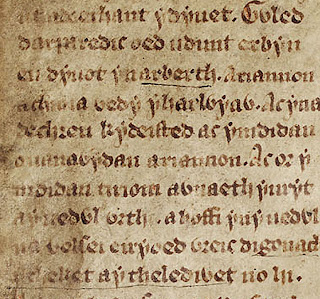 ... and so the manuscript breaks off as we hear that Manawydan finds that he has never met a more beautiful woman than Rhiannon. In the First Branch of Y Mabinogi she arrives with a magical aura about her but acts as a real enough woman to get what she wants. In the Third Branch, the beginning of which the above illustrates, she is even more practically present, at least until she is captured in an enchanted fort. But between these, in the Second Branch, her birds sing over the sea to those that returned from Ireland, "and all the songs they had ever heard were harsh by comparison". In Culhwch and Olwen these same birds of Rhiannon are said to "wake the dead and lull the living to sleep". How can the same tradition, and in fact two tales that lead one into the other, regard the same character at once as a person in the story and an enchantress with magical birds?
... and so the manuscript breaks off as we hear that Manawydan finds that he has never met a more beautiful woman than Rhiannon. In the First Branch of Y Mabinogi she arrives with a magical aura about her but acts as a real enough woman to get what she wants. In the Third Branch, the beginning of which the above illustrates, she is even more practically present, at least until she is captured in an enchanted fort. But between these, in the Second Branch, her birds sing over the sea to those that returned from Ireland, "and all the songs they had ever heard were harsh by comparison". In Culhwch and Olwen these same birds of Rhiannon are said to "wake the dead and lull the living to sleep". How can the same tradition, and in fact two tales that lead one into the other, regard the same character at once as a person in the story and an enchantress with magical birds?One answer is to say that different elements came into the tale from an earlier mythological tradition but this suggests a tale-teller that wasn't in full control of the material. Whatever we think of Culhwch which is full of what might be regarded as scarcely integrated mythical material, the author of the Four Branches does seem to be writing stories in which the elements are consistently integrated. But the two identities of Rhiannon do not seem consistent. The final pages of Branwen eerily evoke something more otherwordly than the rest of the apparently Otherworld characters who come and go as ordinary people.
How can Rhiannon of the birds suddenly become Manawydan's wife? Could the author engage in a sort of double-think? We could propose that the sensibility of medieval authors was different from ours so that they could know what they were dealing with in terms of earlier mythical material while at the same time get on and present a story in the devout christian world they inhabited. Sometimes reading medieval literature I think this, but at others I think they were prone to an intense literalism and their faith was attached to material objects (like obviously fake holy relics). But perhaps they knew full well that they were fakes but nevertheless had faith in their efficacy.
We can learn to read the things they wrote, but can we ever read them as they wrote them?
2 comments:
This is a good question. I think it's partly akin to the weird telescoping of distance, the kind of double perspective, that we get with the sound of the birdsong itself: it's far out over the sea, but paradoxically sounds clear and close. (The idea of bird-song *over the sea* is itself odd. I can't think of any sea-birds that sing.) Just so, Rhiannon is close to us as the practical, sharp-tongued, intelligent character who ages, and distant from us when given this indirect and magically timeless penumbra. The detail of the birds is one of the ways that the narrator suggests an otherworldly atmosphere, that things in Gwales are not as they seem.
I suspect we're not meant to explain it. But in literary terms, I expect that what's happened is that Rhiannon was inherited as a kind of 'faery bride' figure, like a more sophisticated version of the Lady ofg Llyn y Fan Fach; she would be closely akin to some of the faery women in Acallam na Senorach, for example. But the redactor (or a predecessor) has decided to humanise her in a very realistic way for the purposes of the main plot, bringing in the Calumniated Wife motif and having her get older as an apparently mortal woman.
Of course film, and possibly even more television, as a different medium than literature, can't possibly express the exact same sentiments. I totally agree. I think film works on its own agenda always, even when they are trying to stick closely to the based upon written works. Colin Firth shone as Darcy, to be true, and probably could never be replaced, but that doesn't mean he IS Darcy (if that makes clear sense).
Also, my dear friend who watches BBC period dramas with me introduced me to the Mabinogion last year and we enjoyed the reference in Bleak House. I fear I didn't study it very deeply and didn't absorb very much of the stories. I enjoyed your insight!
Post a Comment